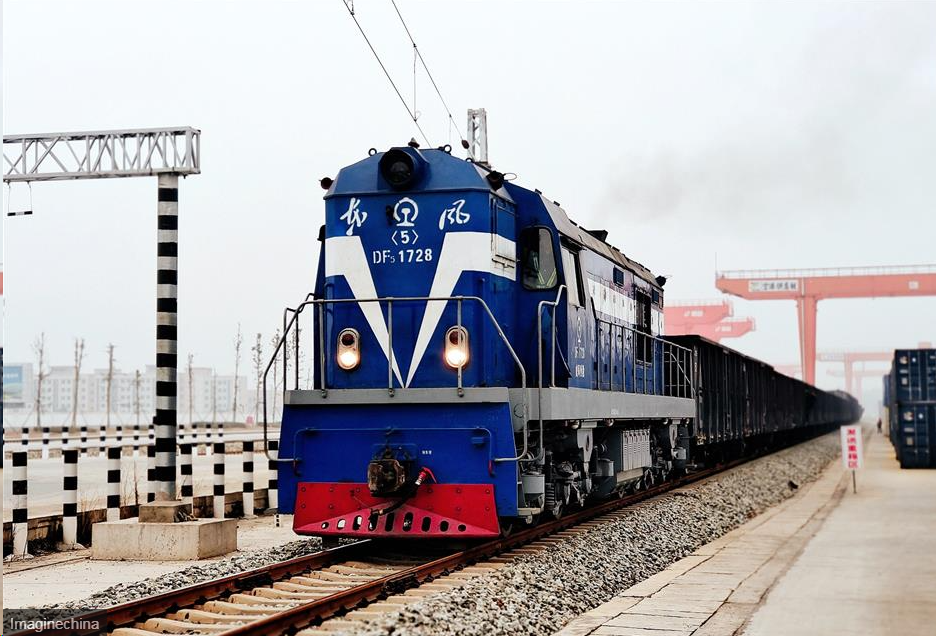News Link: https://www.shine.cn/news/in-focus/2303305725/

A freight train departs Yunnan Province for Laos.
A survey done by the Shanghai Institute of Technology in China and Souphanouvong University in Laos found that Laotians are happy with the changes made by the China-Laos Railway and expect more service improvements in the future.
The survey had 1,000 Laotian respondents fill out a questionnaire about the 1,035-kilometer passenger and freight railway that connects China's Kunming with Laos' capital Vientiane, which began operations in December 2021.
According to the respondents, the railway has increased residents' incomes by providing more jobs and opportunities to start their own businesses. It has also accelerated the development of local tourism, increased international trade, and attracted investment.
The railway stops at several historical cities in Laos, and passengers alighting at Vientiane Station can reach historic scenic spots like Pha That Luang in about 30 minutes.
According to a report issued by the Laos-China Railway Co Ltd, the railway carried 417,400 passengers from January to February 2023, a 256.2 percent increase over the same period in 2022.
The railway also transported 647,700 tons of goods in the two months, a 320 percent increase over the same period last year.
Laos' exports to China totaled US$2.27 billion in 2022, an increase of 3.18 percent year on year, making China Laos' largest export destination, far ahead of Vietnam in second place.
The railway, according to the Laotians, has changed their mode of transportation. The majority of them said they had traveled on the Laos-China Railway, and roughly 60 percent said it had saved them commuting time.
The railway has also increased local residents' spending, with 54.3 percent saying they spent more on transportation, 16.7 percent on tourism, 14.7 percent on shopping, and 12 percent on catering services.
The railway service received positive feedback from respondents due to factors such as high speed, low ticket prices, on-time performance, and comfortable carriages.
More supporting infrastructure, such as bus lines and shuttle buses, is also being developed to make travel in Laos more convenient.
According to the survey, Laotians are looking forward to more railways across the country and increasing train capacity, particularly during peak travel periods.

Laotian graduates of the Shanghai Institute of Technology are now working for the Laos-China Railway Co.
Contribution of Shanghai
It highlighted the need for more rail-related talent.
One of the Chinese universities that assists Laos in its education in railway engineering and management is the Shanghai Institute of Technology.
It signed a cooperation framework agreement with Souphanouvong University in 2017 and began training railway engineers and technicians for Laos in 2018. Since then, it has admitted 40 Laotian undergraduate and master's students in five batches.
The Laos-China Railway Co Ltd hired the first nine Laotian students who graduated from the Shanghai Institute of Technology in 2021.
Likhamsoukyiaseng Tong, a master's student from Laos at the Shanghai Institute of Technology, said he hoped to join the company after graduation to work on the railway.
The railway has created many job opportunities for locals, he said. Even if I am unable to work for the company, I will seek employment in related fields.
Tong said that his elder brother had taken a ride on the railway.
He was overjoyed and sent me photos taken on the train, Tong explained. He said it was very convenient.
In 2021, the institute collaborated with several Laotian and Chinese parties to establish the Belt and Road Initiative Lancang-Mekong Railway Connectivity Center, which will foster collaboration in education, research and cultural exchanges.
The National University of Laos, China Railway Engineering Equipment Group (Laos) Sole Proprietorship Co, Shanghai Shentong Metro Co, and China Railway Shanghai Design Institute Group Co joined the center on Wednesday to lend their strength and wisdom to the development of railway talent and technologies.
We will work with higher-education institutions in countries along the Lancang-Mekong River to carry out more pragmatic cooperation in education, research and people-to-people bonds, said Ke Qinfei, president of the Shanghai Institute of Technology.
Jing Ying, vice president of the Shanghai People's Association for Friendship with Foreign Countries, said the Laotian graduates of the institutions are engineers not only for the China-Laos Railway but also for the two countries' friendship.
She described the China-Laos Railway as a landmark achievement of the Belt and Road Initiative, which has resulted in equitable cooperation and development opportunities for all participating countries.
This year marks the 10th anniversary of Chinese President Xi Jinping's proposal for the Belt and Road Initiative.
The projects of the Jakarta-Bandung High-Speed Railway, which connects Jakarta, Indonesia's capital, with its fourth-largest city, Bandung, and the China-Thailand High-Speed Railway, are also progressing well, she said.
The railways will not only serve as main arteries for freight transport but will also facilitate the connection of supply and industrial trains in China and ASEAN, as well as our common development; they will also serve as blood vessels that nourish people-to-people bonds among countries along the routes.

